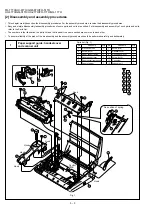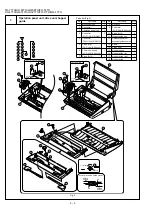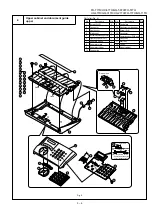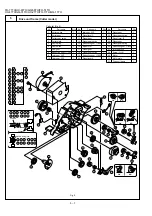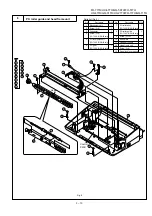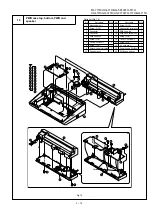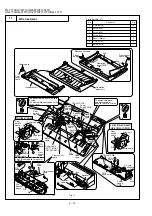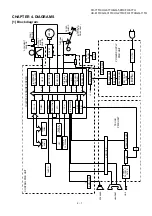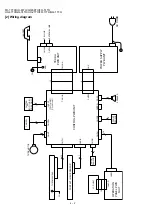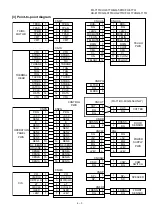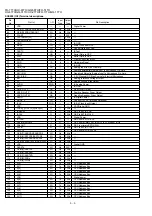
FO-71TH/UX-61TH/GQ-56TH/FO-51TH
UX-41TH/GQ-31TH/UX-21TH/FO-11TH/GQ-11TH
CHAPTER 5. CIRCUIT DESCRIPTION
[1] Circuit description
1. General description
The compact design of the control PWB is obtained by using CONEXANT
fax engine in the main control section and high density printing of sur-
face mounting parts. Each PWB is independent according to its function
as shown in Fig. 1.
2. PWB configuration
Fig. 1
1) Control PWB
The control PWB controls peripheral PWBs, mechanical parts, trans-
mission, and performs overall control of the unit.
This machine employs a 1 chip modem (SCE209) which is installed on
the control PWB.
2) TEL/LIU PWB
This PWB controls connection of the telephone line to the unit.
3) Power supply PWB
This PWB provides voltages of VREG(+5V) and +24V to the other PWBs.
4) Panel PWB
The panel PWB allows input of the operation keys.
5) LCD PWB
This PWB controls the LCD display.
3. Operational description
Operational descriptions are given below:
•
Transmission operation
When a document is loaded in stand-by mode, the state of the docu-
ment sensor is sensed via the 1 chip fax engine (SCE209). With
depression of the START key in the off-hook state, transmission takes
place.
Then, the procedure is sent out from the modem and the motor is
rotated to move the document down to the scan line. In the scan
processor, the signal scanned by the CIS is sent to the internal im-
age processor and the AD converter to convert the analog signal into
binary data. This binary data is transferred from the scan processor
to the image buffer within the RAM and encoded and stored in the
transmit buffer of the RAM. The data is then converted from parallel
to serial form by the modem where the serial data is modulated and
sent onto the line.
•
Receive operation
There are two ways of starting reception, manual and automatic.
Depression of the START key in the off-hook mode in the case of
manual receive mode, or CI signal detection by the LIU in the auto-
matic receive mode.
First, the SCE209 controls the procedure signals from the modem to
be ready to receive data. When the program goes into phase C, the
serial data from the modem is converted to parallel form in the mo-
dem interface of the 1 chip fax engine (SCE209) which is stored in
the receive buffer of the RAM. The data in the receive buffer is de-
coded software-wise to reproduce it as binary image data in the im-
age buffer. The data is DMA transferred to the recording processor
within the SCE209 which is then converted from parallel to serial
form to be sent to the thermal head. The data is printed line by line by
the SCE209 which is assigned to control the motor rotation and strobe
signal.
•
Copy operation
To make a copy on this facsimile, the COPY key is pressed when the
machine is in stand-by with a document on the document table and
the telephone set is in the on-hook state. First, depression of the
COPY key advances the document to the scan line. Similar to the
transmitting operation, the image signal from the CIS is converted to
a binary signal in the DMA mode via the 1 chip fax engine (SCE209)
which is then sent to the image buffer of the RAM. Next, the data is
transferred to the recording processor in the DMA mode to send the
image data to the thermal head which is printed line by line. The
copying takes place as the operation is repeated.
5 – 1
LCD
PWB
PANEL
PWB
CONTROL
PWB
TEL/LIU
PWB
POWER
SUPPLY
PWB
TX/RX
MOTOR
AC CORD
CIS

